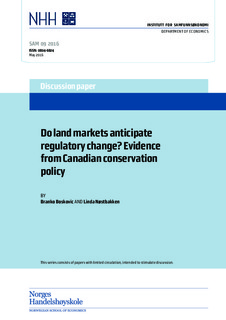| dc.contributor.author | Boskovic, Branko | |
| dc.contributor.author | Nøstbakken, Linda | |
| dc.date.accessioned | 2016-05-23T10:14:46Z | |
| dc.date.available | 2016-05-23T10:14:46Z | |
| dc.date.issued | 2016-05-23 | |
| dc.identifier.issn | 0804-6824 | |
| dc.identifier.uri | http://hdl.handle.net/11250/2390012 | |
| dc.description.abstract | Land prices across administrative boundaries can be useful for estimating the causal effects of local policy. Market anticipation about potential boundary changes can confound identification, so studies often avoid markets where this may arise. We develop an approach to quantify anticipation by separately identifying the causal effect of local
policy and the market's subjective beliefs that administrative boundaries will change. Using land prices and changes to land use regulation boundaries, our estimates indicate that anticipation does matter quantitatively: it increases the welfare cost of the policy by one-quarter and empirical analysis that omits anticipation underestimates this cost by nearly one-half. | nb_NO |
| dc.language.iso | eng | nb_NO |
| dc.relation.ispartofseries | SAM;9/2016 | |
| dc.subject | Regulation, anticipation, land values, zoning, oil leases, endangered species. | nb_NO |
| dc.title | How much does anticipation matter? Evidence from anticipated regulation and land prices. | nb_NO |
| dc.type | Working paper | nb_NO |
| dc.subject.nsi | VDP::Social science: 200::Economics: 210 | nb_NO |
| dc.source.pagenumber | 38 | nb_NO |
